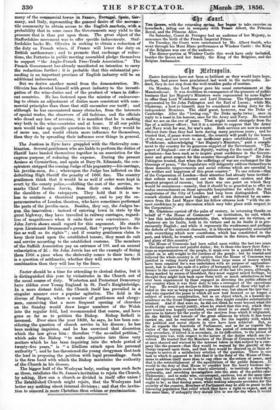The Justices in Eyre have grappled with the Shrievalty com-
bination. Several gentlemen who are liable to perform the duties of Sheriff have banded themselves together in an association for the express purpose of reducing the expense. During the present Assizes at Carmarthen, and again at Bury St. Edmunds, the con- spirators stripped the coming Judge of his pageantry—his carriage, his javelin-men, &c. ; whereupon the Judge has inflicted on the defaulting High Sheriff the penalty of 1001. fine. The country gentlemen think that it would be as well if order were kept in court by the county police,—shifting the cost of the service, re- marks Chief Justice Jervis, from their own shoulders to the shoulders of the ratepayers. They hold that it is use- Imo to continue a theatrical pageantry, and to pay the su- pernumeraries of London theatres, who have sometimes performed the parts of the javelin-men. Besides, they say, the Judges be- gan the. innovation : instead of entering town in state by the great highway, they have travelled in railway carriages, regard- less of magnificence when it suits their own convenience. Sir John Jekvis shows small regard for this argument. He stands upon Lieutenant Drummond's ground, that "property has its du- ties as well as its rights" ; and if country gentlemen claim to keep their land upon the established tenure, they must do suit and service according to the established customs. The members of the Suffolk Association pay an entrance of 101. and an annual subscription of 21.: Sir John Jervis has set the example of fining them 100/. a piece when the shrievalty comes to their turn : it is a question of arithmetic, whether they will save more by their combination than they will lose by the tines.


























 Previous page
Previous page